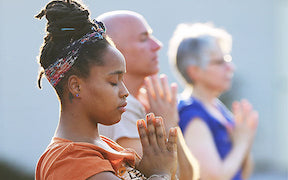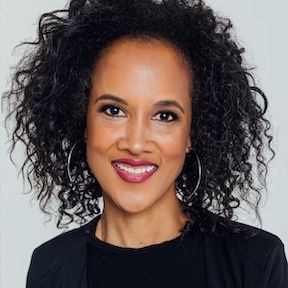by Kamala Itzel Hayward
My first Yoga teacher was my mother. I still remember her lavender tights. She still remembers that my favorite part of class was hissing like a snake as I raised up into cobra pose. I was five years old. And there was no reason to question that I belonged or that the peace and joy, love, and light that we wished for everyone included me, regardless of who I was, what I looked like, or what my body could do.
My practice has changed a lot over the years—I’m less flexible and I don’t hiss in bhujangasana anymore—but one guiding principle has remained the same: perpetuating systems of oppression and living in liberation are mutually exclusive.
The teachings of Yoga identify ignorance in all of its forms as the root cause of suffering. This ignorance includes systems of white supremacy, the gender binary, capitalism, and other concepts that lead to the systemic oppression of individuals. However, this truth isn’t always reflected in the spaces where Yoga teachers are trained or teach. Nor is it reflected on social media or in Yoga publications that elevate one stereotype of “the Yoga teacher” over all others in their cover images, stories, and advertisements: the young, flexible, thin, heteronormative white woman.
So in 2016, after I had been teaching Yoga for 6 years and practicing it for decades more, I was thrilled to hear Lakshmi Nair talk about her work. Lakshmi is the creator of the Satya Yoga Cooperative in Denver, Colorado, which is one of the first Yoga cooperatives for people of color.
I couldn’t help but wonder what it would be like to be a part of a Yoga community where I saw myself reflected in the eyes of my teachers. One that shared my values and my commitment to the liberation of all people, while also having in its deep awareness the context in which we are learning and practicing Yoga: a society that does not share that commitment.
A society that is actively operating contrary to that commitment.
A society that was built on—and, in so many deeply rooted and systemic ways—sustained by the oppression of people based on their race, class, gender, and more. A society that isn’t always aware of or willing to acknowledge its biases, privileges, and limiting beliefs, in direct contradiction to Yogic principles of self-awareness and self-study.
I wondered, “What would it be like to practice and learn in a community intentionally focused on Yoga as a tool for dismantling such beliefs and oppressive systems in service of the liberation of all beings everywhere?”
Then I had my chance.
Four years later, I had the opportunity to attend the Black Orchid Yoga Teacher Training, a prenatal/postnatal Yoga Teacher Training offered by Melylah Smith, Alexandra Rossi, and Jane Austin. In an effort to address the devastating racial disparities in prenatal care, they offered the training completely free to Black women.
When I heard about it, I registered immediately. I, along with over 250 Yoga teachers, doulas, pregnant women, and more … all Black. Not only did I love the program, I fell completely in love with the community that was created in the process.
And I loved knowing that, together, we could make a difference to improve outcomes for Black newborns and pregnant Black folks everywhere on the level of body, mind, and spirit.
The experience was so meaningful and powerful, I knew that I wanted to be a part of bringing something like that to IYI. So I went to Swami Ramananda, Director of IYI SF, told him my idea, and asked if he’d be willing to bring it to IYI. Without a moment’s hesitation, he said yes.
So under his leadership, Integral Yoga’s 100% scholarship-based Black, Indigenous, People of Color 200-hour Basic Yoga Teacher Training was born.
When I imagined this training, I imagined a space where not only all of the students were BIPOC, but so were all of the lead teaching team members, the monitors, and the support staff. I also wanted there to be folks of a wide variety of ages, body types, genders, sexual orientations, and physical abilities. I dreamed of a teaching curriculum that acknowledged the ways in which the teachings of Yoga have been offered that have harmed others, and how we as teachers could do things differently. I wanted to talk about racism, the gender binary, capitalism, xenophobia, cultural appropriation, colonialism, spiritual bypass, intersectionality, and other forms of oppression that we and our students come to Yoga to heal from. And I dreamed of a panel of guest speakers composed of those BIPOC Yoga teachers who most deeply influenced me and my thinking of Yoga in this way.
It was a big dream. And I knew that experienced Integral Yoga Lead Teacher Trainer Mukunda Marc Morozumi shared this vision, so I went to him first. What I didn’t know was that many, many other people in the Integral Yoga sangha also shared this vision and the passion to bring it into fruition. A full teaching team was assembled in no time, including Integral Yoga teacher Mia Velez and anatomy teacher Arturo Peale. A team of Integral Yoga sangha members interested in serving as monitors and guest trainers fell quickly into place, including Amie, Atman Adolfo Velasquez, Bodhi Bryahnna Trice, Devatman Daniel Givens, Dharani Diana Diaz, Kayko Watanabe, Kusuma Aralere, Jaya Gen McDonough, Lakshmi Angelica Gutierrez, Muktidevi Demafeliz, Shanti Nucharin Songsasen, Rasmi Lorette Angue, Renda Dabit, Rukmini Ando, Tinuola Bello, and Shankari Goldstein. And other luminaries in the field of Yoga agreed to serve as guest presenters including Anthony Williams, Dia Joyce Penning, Dianne Bondy, Dr. Gail Parker, Jasmin Leyva, Jordan Smiley, Lakshmi Nair, Reggie Hubbard, Regina, and Saeeda Hafiz.
And the Integral Yoga sangha supported us every step of the way in the form of donations, spreading the word, and love and encouragement.
They also made it possible for us to make the teacher training 100% scholarship-based, which allowed for the elimination of any financial barriers to participation. Many students paid for the training at the highest level–reinforcing the notion that, while money is a very real obstacle to participating in teacher trainings that many BIPOC face, it’s not the only obstacle. BIPOC also need safe spaces to learn, explore, make mistakes, ask questions, practice, and simply be. Trainings like these help to create those safe spaces. They also increase the diversity of Yoga’s teaching community, which allows for the creation of more inclusive and welcoming Yoga spaces, makes the teachings of Yoga more accessible, and affirms Yoga as a teaching and practice for the liberation of all beings everywhere.
Congratulations to the 27 graduates of Integral Yoga’s first BIPOC teacher training: Amanda Abhaya Vigil, Andreina Maldonado, Ankita Chawla, Arpita Roy, Azza Gasmelseed, Candi Reddick, Cleopatra Eve Altieri, Dannhae Amba Maya Herrera Wilson, Durba Chatterjee, Evelyn Sita NG, Akama Gautam Tirath Mulchandani, Grace Shakini Sunny Munch, Isha Rosemond, Jennifer Webb, John Youngblood, Khadijah Okoh, Kiara Dailey, Marilyn Vaani Pagán-Banks, Mateo Ilarina, Meenakshi Wojtczak, Melissa Montez, Mercy Ramani Mungwadzi, Monica Andrea Ferrey, Anjali Rachel Porraspita, Srishti Satya Roy, Ummkhair Kalyani Brown, and Vatasha Davis.
May you all shine as examples of the glorious science of Yoga.
Kamala is a yoga teacher, a radical self-love coach, a mindful communication trainer, and a fierce and compassionate advocate for love. After serving as a public policy lawyer for 13 years, Kamala left her legal career and founded Attuned Living, a mindfulness and wellness organization working at the intersection of love and social justice. Her unique work is based on the teachings of yoga, mindful communication, and social justice studies.]


